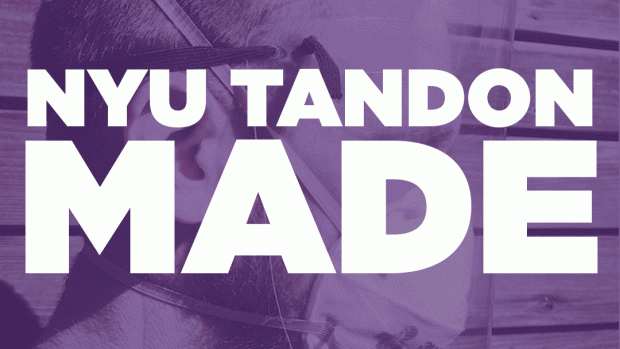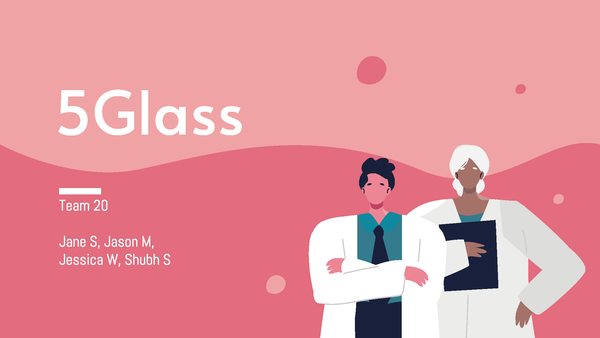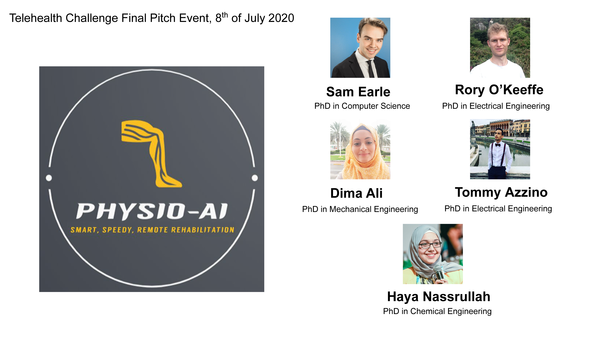Incoming students prove they’re ready to work, innovate, and problem-solve

The NYU Tandon School of Engineering’s 2020 Tandon Made Challenge calls upon incoming undergraduate and graduate students to team with their future classmates to solve a pressing healthcare challenge in a world grappling with COVID-19. The first challenge — finding ways to retrofit existing hardware so that it could be used without human contact, thereby limiting the spread of COVID-19 and other viruses — resulted in dozens of innovative modifications, from no-touch elevator buttons to pocket-sized, adjustable covers for bike and shopping cart handles.
While judges had a difficult time choosing the winners of the two $5,000 prizes on offer at the end of that first competition, their task was even harder during the second challenge, which asked competitors (many now seasoned veterans of challenge one) to use 5G and other wireless technologies to provide remote diagnostics, patient support, treatment, and beyond.
Several teams dove in, and with the help of assigned mentors — including Jerry Brager, the Chairman and CEO of 1-800-Doctors and Harrison Lung, a partner at McKinsey & Company specializing in business, technology strategy, and wireless communications — they brainstormed, researched competing products, projected scalability, and other steps necessary to create a potentially viable, market-ready product.

5Glass, smart glasses for emergency medical technicians, was named undergraduate winner.
Among the ideas that made it to the finals, held on July 8 via Zoom, were:
- The Telehealth Booth, a modular unit that gives patients a safe, secure, and easy way to obtain basic clinical measurements and preliminary diagnoses without heading to the hospital
- Mind-School, a set of therapeutic games aimed at improving the mental health and well-being of children
- PhysioAI, an online platform using advanced machine-learning techniques to provide physical rehabilitation and therapy for patients
- 5Glass, a device that enables medical responders to stream live footage of a patient during an ambulance ride
- THEREAPY, a motion-capture-based feedback system that displays inaccuracies in patient positioning and movement during remote physical therapy sessions, thereby boosting their effectiveness
- Homey, a digital platform focused on homeopathic diagnosis and treatment
The judges subjected each team to a strenuous round of questions, seeking to determine if the proposed product took a unique and defensible approach to the problem it was addressing, whether it could move beyond the ideation and prototyping phase and support the needs of a sufficient market and whether the team had identified its needs and next steps to take their concept and turn it into a prototype, using the prize money and NYU Tandon resources. (The winners are expected to continue development in the fall, with the goal being to allow them to launch workable entrepreneurial ventures.)
When the judging was over, 5Glass had been named the undergraduate team winner, and PhysioAI carried the day at the graduate level.

Physio-AI, an online platform that provides physical rehabilitation, was the graduate team winner.
“Given the high level of work we saw in this second challenge, we’re really excited for the third edition, which kicks off on July 13 and asks participants to develop ways to remotely control critical healthcare equipment like ventilators and dialysis machines without placing healthcare workers into a potentially threatening environment that could be contaminated with a virus like COVID-19,” said Neal Rooney, Project Manager for the NYU Tandon Made Challenge and former president of the InnoVention Society. “And given this dynamic motivated group of incoming students, we’re even more excited for the new semester to start so we can bring these concepts to market.”
Wait . . . there’s more
Organizers recently announced that any teams participating in all three Challenges (no-touch hardware, telehealth, and the soon-to-launch remote medical-device control) would receive a $500 Prototyping Prize in recognition of their entrepreneurial spirit.
The prize will go towards the development of a prototype based on one of the ideas submitted during the summer, and at the end of the fall semester, these groups, in addition to the winning teams, will present their prototypes at the NYU Tandon Made Challenge Prototyping Showcase.




